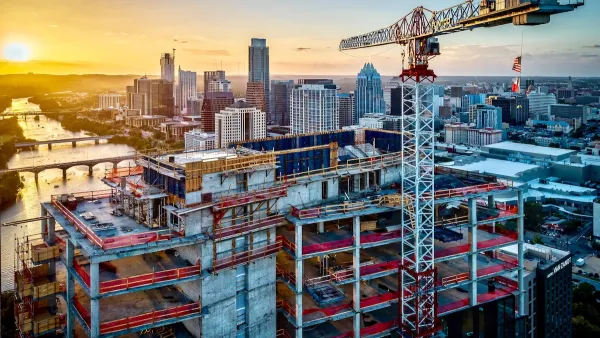Proposed zoning updates that would make it easier to convert office buildings in commercial districts to housing and other uses could yield up to 20,000 new housing units in the next decade.

A new plan by New York City Mayor Eric Adams eases the way for developers to convert office buildings to housing and other uses, reports David Brand in Gothamist. “The plan, which draws on recommendations from a city task force convened in July, could pave the way for up to 20,000 new apartments over the next decade, Adams said.”
According to the task force, the vacancy rate for Manhattan office space was 20 percent in late 2022—double the rate in 2019—while the vacancy rate for apartments with rent below $1,500 per month is lower than 1 percent. “Adams’ office conversion proposal would target Midtown Manhattan, as well as other commercial districts, like Downtown Flushing and Bronx Hub. The plan would also allow for a range of housing types, including supportive housing for people who have experienced homelessness and would require changes to city and state laws around zoning requirements.”
Brand notes that prior proposals to convert New York City hotel rooms to housing stalled. As of last September, no hotel rooms had been converted, and hotel occupancy rebounded, causing hotel owners to lose interest in the program.
In an opinion piece in the New York Daily News, Department of City Planning Director Dan Garodnik explains the outdated zoning regulations that hold back building conversions. Notably, buildings built after 1961 (or 1977 in the Financial District) are ineligible for conversion under current rules. According to Garodnik, “That thinking is far too small for today’s challenges.” Garodnik adds, “Expanding the options available to these office buildings will help ensure our business districts’ vitality. And while housing is the top priority, we also need to think creatively about how offices can be turned into child care centers, schools, labs, and other uses we want to see.”
FULL STORY: Mayor Adams unveils plans to turn NYC offices into 20,000 new apartments

Maui's Vacation Rental Debate Turns Ugly
Verbal attacks, misinformation campaigns and fistfights plague a high-stakes debate to convert thousands of vacation rentals into long-term housing.

Planetizen Federal Action Tracker
A weekly monitor of how Trump’s orders and actions are impacting planners and planning in America.

San Francisco Suspends Traffic Calming Amidst Record Deaths
Citing “a challenging fiscal landscape,” the city will cease the program on the heels of 42 traffic deaths, including 24 pedestrians.

Defunct Pittsburgh Power Plant to Become Residential Tower
A decommissioned steam heat plant will be redeveloped into almost 100 affordable housing units.

Trump Prompts Restructuring of Transportation Research Board in “Unprecedented Overreach”
The TRB has eliminated more than half of its committees including those focused on climate, equity, and cities.

Amtrak Rolls Out New Orleans to Alabama “Mardi Gras” Train
The new service will operate morning and evening departures between Mobile and New Orleans.
Urban Design for Planners 1: Software Tools
This six-course series explores essential urban design concepts using open source software and equips planners with the tools they need to participate fully in the urban design process.
Planning for Universal Design
Learn the tools for implementing Universal Design in planning regulations.
Heyer Gruel & Associates PA
JM Goldson LLC
Custer County Colorado
City of Camden Redevelopment Agency
City of Astoria
Transportation Research & Education Center (TREC) at Portland State University
Jefferson Parish Government
Camden Redevelopment Agency
City of Claremont





























